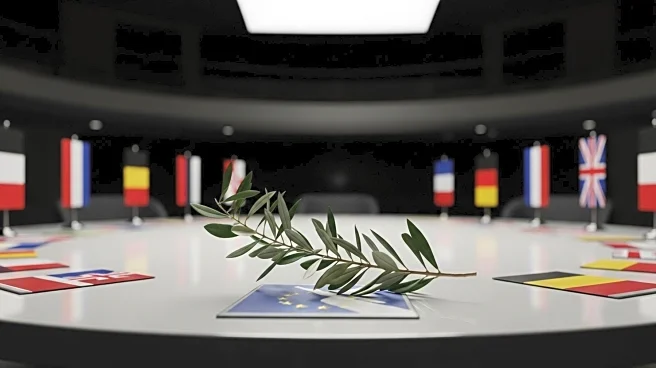What's Happening?
European Union members are set to convene in Luxembourg to deliberate on how Europe can contribute to President Trump's Gaza peace deal. This meeting follows a summit in Sharm el-Sheikh, Egypt, where President Trump addressed world leaders on ending the Gaza war. The U.S.-brokered agreement includes a prisoner-hostage swap and a ceasefire deal between Israel and Hamas. The EU aims to maximize its influence on Gaza and potentially join the Board of Peace, as suggested by a document outlining the EU's strategic interests in the region.
Why It's Important?
The EU's involvement in President Trump's Gaza peace deal could significantly impact the geopolitical landscape in the Middle East. By supporting the U.S.-brokered agreement, the EU may enhance its diplomatic influence in the region, potentially leading to more stable relations between Israel and Palestine. This move could also strengthen transatlantic ties, showcasing a unified approach to conflict resolution. However, the EU's decision may face scrutiny from member states with differing views on Middle Eastern policy, affecting internal cohesion and foreign policy strategies.
What's Next?
The upcoming meeting in Luxembourg will likely address the EU's role in the peace process and its potential contributions to the Board of Peace. Discussions may focus on diplomatic strategies, financial support, and humanitarian aid to ensure the success of the ceasefire and prisoner-hostage swap. The EU's decision could prompt reactions from major stakeholders, including Israel, Palestine, and other Middle Eastern countries, influencing future negotiations and peace efforts in the region.
Beyond the Headlines
The EU's support for President Trump's Gaza peace deal may have long-term implications for international diplomacy and conflict resolution. It could set a precedent for collaborative efforts between the U.S. and EU in addressing global conflicts, potentially leading to more comprehensive peace strategies. Additionally, the EU's involvement may influence its foreign policy priorities, emphasizing peace-building and humanitarian efforts in conflict zones.









